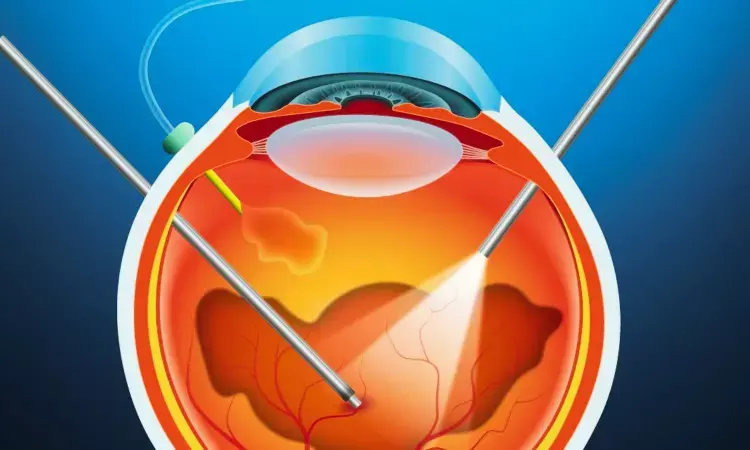- Home
- Medical news & Guidelines
- Anesthesiology
- Cardiology and CTVS
- Critical Care
- Dentistry
- Dermatology
- Diabetes and Endocrinology
- ENT
- Gastroenterology
- Medicine
- Nephrology
- Neurology
- Obstretics-Gynaecology
- Oncology
- Ophthalmology
- Orthopaedics
- Pediatrics-Neonatology
- Psychiatry
- Pulmonology
- Radiology
- Surgery
- Urology
- Laboratory Medicine
- Diet
- Nursing
- Paramedical
- Physiotherapy
- Health news
- Fact Check
- Bone Health Fact Check
- Brain Health Fact Check
- Cancer Related Fact Check
- Child Care Fact Check
- Dental and oral health fact check
- Diabetes and metabolic health fact check
- Diet and Nutrition Fact Check
- Eye and ENT Care Fact Check
- Fitness fact check
- Gut health fact check
- Heart health fact check
- Kidney health fact check
- Medical education fact check
- Men's health fact check
- Respiratory fact check
- Skin and hair care fact check
- Vaccine and Immunization fact check
- Women's health fact check
- AYUSH
- State News
- Andaman and Nicobar Islands
- Andhra Pradesh
- Arunachal Pradesh
- Assam
- Bihar
- Chandigarh
- Chattisgarh
- Dadra and Nagar Haveli
- Daman and Diu
- Delhi
- Goa
- Gujarat
- Haryana
- Himachal Pradesh
- Jammu & Kashmir
- Jharkhand
- Karnataka
- Kerala
- Ladakh
- Lakshadweep
- Madhya Pradesh
- Maharashtra
- Manipur
- Meghalaya
- Mizoram
- Nagaland
- Odisha
- Puducherry
- Punjab
- Rajasthan
- Sikkim
- Tamil Nadu
- Telangana
- Tripura
- Uttar Pradesh
- Uttrakhand
- West Bengal
- Medical Education
- Industry
Which is better for uncomplicated retinal detachment, pars plana vitrectomy with silicone oil or gas tamponade?

Canada: In a comprehensive review that delves into the efficacy of different tamponade agents used in pars plana vitrectomy (PPV) for treating uncomplicated retinal detachment, researchers have shed light on the comparative benefits of silicone oil versus gas tamponade. The findings unveiled through a systematic review and meta-analysis offer valuable insights into optimizing treatment strategies for this sight-threatening condition.
The study, published in the American Journal of Ophthalmology, revealed that PPV with gas tamponade is tied to better functional outcomes than PPV with silicone oil; however, both tamponades yielded comparable primary reattachment rates.
Retinal detachment, characterized by the separation of the retina from the underlying retinal pigment epithelium, poses a significant threat to vision if left untreated. PPV, a surgical procedure involving the removal of the vitreous gel and subsequent tamponade of the retina, serves as a primary intervention for retinal detachment. However, the choice of tamponade agent—silicone oil or intraocular gas—remains debatable among ophthalmologists.
Against the above background, Rajeev H. Muni, University of Toronto, Toronto, Ontario, Canada, and colleagues aimed to compare the efficacy of pars plana vitrectomy with silicone oil compared to gas tamponade for uncomplicated rhegmatogenous retinal detachment.
For this purpose, the research team conducted a systematic literature search on online databases from 2000 to 2023 for comparative studies evaluating the efficacy and safety of PPV with either silicone oil or gas tamponade in uncomplicated RRD.
The primary outcome was best-corrected visual acuity (BCVA) at the last study observation. Secondary outcomes included the rates of retinal reattachment, retinal thickness, and the incidence of adverse events. Meta-analysis was performed using a random-effects model.
The researchers reported the following findings:
· Nine observational studies reporting on 491 RRD eyes were included.
· The mean BCVA at the last study observation was significantly better in the gas tamponade group than in the silicone oil group (WMD=0.17 logMAR).
· Rates of primary retinal reattachment were similar between the silicone oil and gas tamponade groups.
· The ganglion cell layer was significantly thinner in the silicone oil group compared to the gas tamponade group (WMD=-3.70 µm, as was the inner plexiform layer (WMD=-2.45) and outer nuclear layer (WMD=-11.74 µm).
The meta-analysis showed that gas tamponade may be tied to improved final BCVA compared to silicone oil tamponade, although both tamponades yield comparable primary reattachment rates. The study observed a significant reduction in the thickness of the outer nuclear layer (ONL), inner plexiform layer (IPL), and ganglion cell layer (GCL) in the silicone oil group, indicating potential adverse effects on certain retinal layers that warrant further investigation.
"Overall, our results did not support the routine silicone oil use for uncomplicated RRDs; we suggest considering individualized approaches to care," the researchers wrote.
"Future studies should aim to examine the long-term visual and anatomical outcomes of these tamponades and explore the patient-centered factors that impact the choice of tamponade in clinical practice more closely."
Reference:
Huang RS, Mihalache A, Lau THA, Popovic MM, Kertes PJ, Muni RH. Pars plana vitrectomy with silicone oil or gas tamponade for uncomplicated retinal detachment: a systematic review and meta-analysis. Am J Ophthalmol. 2024 May 28:S0002-9394(24)00209-5. doi: 10.1016/j.ajo.2024.05.008. Epub ahead of print. PMID: 38815844.
Dr Kamal Kant Kohli-MBBS, DTCD- a chest specialist with more than 30 years of practice and a flair for writing clinical articles, Dr Kamal Kant Kohli joined Medical Dialogues as a Chief Editor of Medical News. Besides writing articles, as an editor, he proofreads and verifies all the medical content published on Medical Dialogues including those coming from journals, studies,medical conferences,guidelines etc. Email: drkohli@medicaldialogues.in. Contact no. 011-43720751


